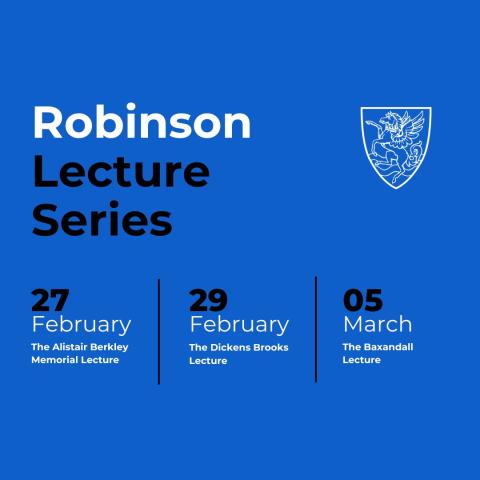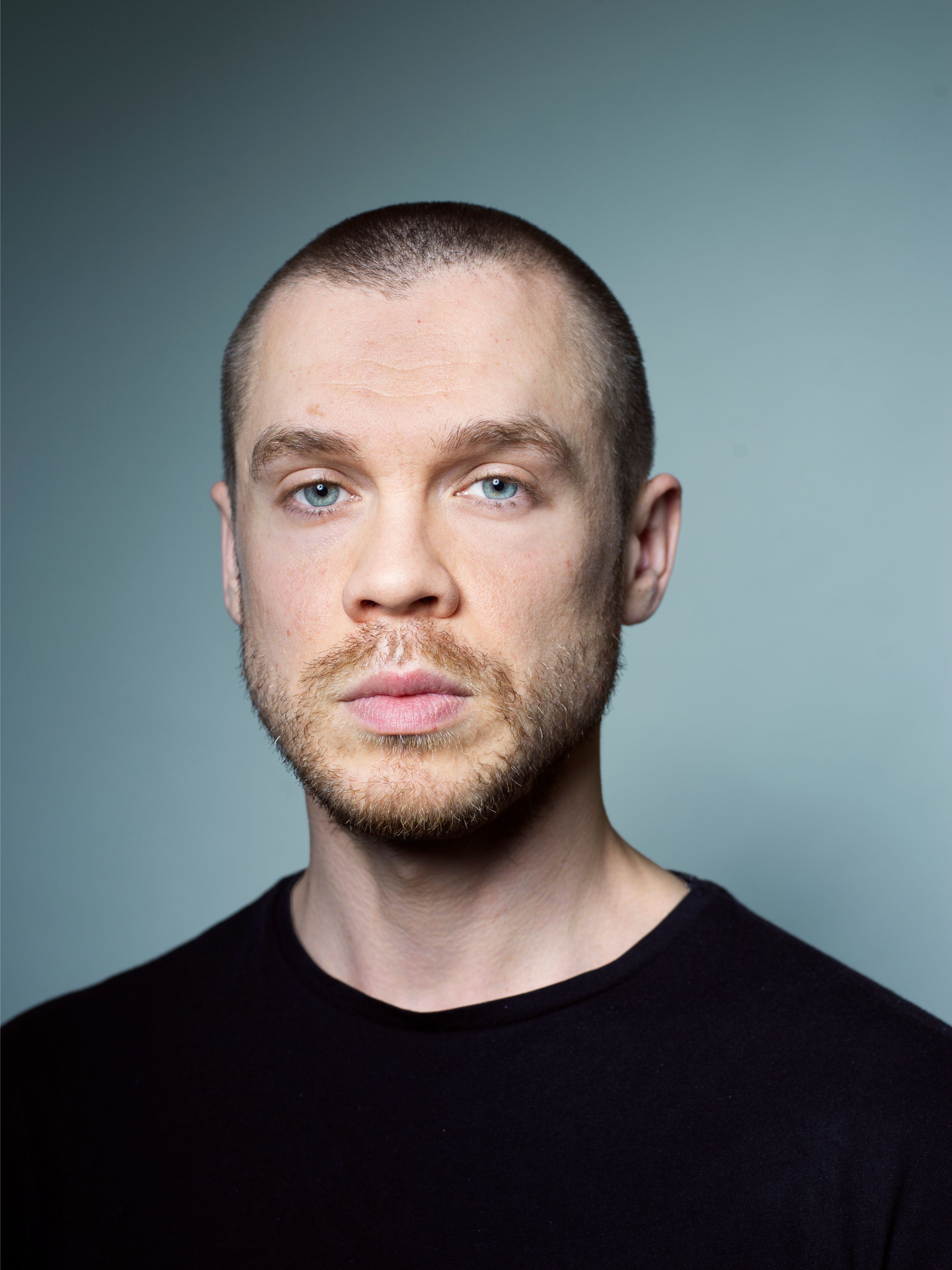Robinson announces 2024 Lecture Series

Robinson is excited to announce the 2024 Robinson Lecture Series: three fascinating lectures taking place in College in February and March, featuring guest speakers from a range of fields. These lectures are all free and open to the public, with details below on how to register for each one.
The Alistair Berkley Memorial Lecture
"How to be Human in a Collapsing Economy"
Date: Tuesday 27 February
Time: 5:00pm-6:30pm, followed by a drinks reception
Location: The Auditorium, Robinson College, Cambridge
Speaker: Gary Stevenson
Click through to register for tickets.

Speaker bio: Gary Stevenson left his trading career behind, convinced that solving inequality was the only way to repair the world economy. He has since studied for an MPhil at Oxford, worked with economic think-tanks and founded a YouTube channel, GarysEconomics, teaching people about real-world economics. He regularly appears on television and radio and has written for the Guardian and OpenDemocracy, among others. Gary's first book, The Trading Game, will be published by Allen Lane on 5th March.
The lecture is named in memory of Alistair Berkley, a student at Robinson College who was killed in the Lockerbie Air Disaster. Alistair’s parents established it to honour their son’s commitment to social justice, focusing in particular on issues of equality. Please note: this event will be filmed.
Photo credit: Pål Hansen
The Dickens Brooks Lecture
"Faith and Survival: A Religious History of the Thirty Years' War"
Date: Thursday 29 February
Time: 5:30pm-6:30pm, followed by a drinks reception
Location: Crausaz Wordsworth Building, Robinson College, Adams Road, Cambridge
Speaker: Professor Bridget Heal
Click through to register for tickets.
The Thirty Years War (1618-1648) was Germany’s first ‘Great War’. Europe had experienced nothing like it before and would experience nothing like it again until the twentieth century. It brought with it a population loss of up to two-thirds in parts of the Holy Roman Empire and an unprecedented level of material destruction. The conflict was primarily about governance, politics, and the balance of power within Europe. But religious divisions also played a part. This lecture will serve as a call to augment the study of religion’s role in precipitating and prolonging early modern conflict with a recognition of the importance of faith for survival and recovery. It will consider the disruption of everyday religious life during the war and will focus on resilience, analysing the beliefs and practices that helped individuals and communities endure prolonged crises. Finally, it will ask what religious recovery looked like, exploring the new stability of the post-war period.
 Speaker bio: Professor Bridget Heal studied in Cambridge and in London and has been at the University of St Andrews since 2002 where she is currently Head of History. Her research focusses on the long-term impact of the Protestant and Catholic Reformations on German society and culture. The most distinctive element of her approach has been the incorporation of visual evidence into the broader frameworks of religious history. She is the author of two monographs, The Cult of the Virgin Mary in Early Modern Germany: Protestant and Catholic Piety, 1500-1648 and A Magnificent Faith: Art and Identity in Lutheran Germany as well as numerous articles and essays. She is currently writing a religious history of the Thirty Years War.
Speaker bio: Professor Bridget Heal studied in Cambridge and in London and has been at the University of St Andrews since 2002 where she is currently Head of History. Her research focusses on the long-term impact of the Protestant and Catholic Reformations on German society and culture. The most distinctive element of her approach has been the incorporation of visual evidence into the broader frameworks of religious history. She is the author of two monographs, The Cult of the Virgin Mary in Early Modern Germany: Protestant and Catholic Piety, 1500-1648 and A Magnificent Faith: Art and Identity in Lutheran Germany as well as numerous articles and essays. She is currently writing a religious history of the Thirty Years War.
The Dickens-Brooks Lecture series was originally founded by Dr P N Brooks, to celebrate the life and achievements of Professor A. G. Dickens, the eminent Reformation historian and sometime Director of the Institute of Historical Research, to advertise the major contribution of Cambridge to the study of the history of the Reformation, understood in the widest sense to include also Theology, Art History, Music, Architecture and Literature and to underline the commitment of Robinson College to the furthering of these enquiries within and beyond the University.” Please note: this event will be filmed.
The Baxandall Lecture
"An Archbishop at the End of Time: Politics and Episcopal Power c. 1000"
Date: Tuesday 5 March 2024
Time: 5pm-6pm
Location: Umney Theatre, Robinson College, Cambridge
Speaker: Professor Catherine Cubitt
Click through to register for tickets
Speaker bio: Professor Catherine Cubitt is Professor Emerita of Medieval History at the University of East Anglia and the Baxandall Visiting Fellow at Robinson College. Professor Cubitt studied Anglo-Saxon, Norse and Celtic and History at Cambridge, before working as a research assistant for the English Place-Name Society and completing an MA in Germanic Philology at University College, London. She came back to Cambridge for PhD on Anglo-Saxon Church Councils c. 650-c. 850 which was published as a book in 1995 by Leicester University Press. She has worked at the universities of University College, London, Leeds, Birmingham, York and East Anglia, retiring from the latter in 2022. Her research focuses on the early medieval world, especially the church in pre-Conquest England and latest book, Sin and Society in Tenth- and Eleventh-Century England will be published by CUP in 2024/5. She is interested in the role of bishops not only in the church but also in the early medieval political sphere, particularly their ability to shape political culture, especially ideas of kingship and the kingdom as a Christian community. Her current research project is a biography of Archbishop Wulfstan II of York (1002-1023), a key political player at a time of great instability in the English kingdom and major writer, who composed vernacular sermons, law codes and political tracts. She was President of the Ecclesiastical History Society for 2022-23, has been a member of the council of the Royal Historical Society and a trustee of the Historical Association, of the History subpanel of the 2014 and 2021 Research Exercise Framework.
The Baxandall Lecture is made possible by a generous gift from Dr Leigh Baxandall (Natural Sciences - Physical, 1979).